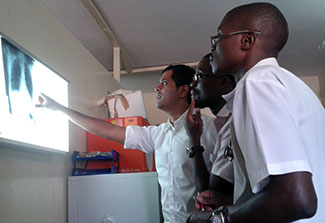Focus on cancer: Fogarty and NIH have catalyzed cancer research in Malawi
July / August 2018 | Volume 17, Number 4

Photo courtesy of Dr. Satish Gopal
Fogarty funding helped establish cancer research in
Malawi, according to the University of North Carolina’s
Dr. Satish Gopal (left).
By Karin Zeitvogel
A decade ago, Malawians with cancer had little hope of receiving meaningful treatment. Even a diagnosis could take more than six months, with only a single pathology lab to process specimens in the entire country. There was almost no capacity to conduct cancer research, despite the high-prevalence of HIV/AIDS in the population, and growing number of patients with related malignancies such as Kaposi’s sarcoma (KS) and cervical cancer.
That began to change in 2010, when Malawi received a five-year
Medical Education Partnership Initiative (MEPI) award that was administered by Fogarty, and provided $1.9 million from the NIH and the President’s Emergency Plan for AIDS Relief (PEPFAR). The grant supported a dedicated cancer clinic, strengthened cancer registries, and enabled specialized training in oncology nursing, cancer diagnosis, epidemiology, chemotherapy preparation and dosing, and palliative care. For the first time, a pathology lab was established in the capital, Lilongwe, and relevant training provided, reducing specimen processing time to two weeks. (Read the related
Q and A with Dr Tamiwe Tomoka, who leads the Malawi pathology laboratory.) The country’s health ministry endorsed the effort, acknowledging the significance of the problem, including cancer in its strategic plan and pledging to improve cancer care across the board.
These fledgling efforts received a boost in 2012, with the arrival of University of North Carolina (UNC) oncologist and scientist Dr. Satish Gopal. Armed with both a Fogarty Fellowship grant and a larger, five-year research award, funded by Fogarty and the National Cancer Institute (NCI), Gopal's aim was to help catalyze the nascent cancer research culture in Malawi.
Aided by his Malawian partners and a steady stream of Fogarty Fellows, Gopal said research productivity quickly began to rise, resulting in publications on various aspects of HIV-related malignancies. Two years later, he and his partners successfully competed for a $3.7 million NCI award, co-funded by Fogarty, to establish the
UNC-Malawi Cancer Consortium and continue to develop research capacity and conduct studies of the most common (KS) and the most curable (lymphoma) HIV-associated cancers.
His Malawian co-Principal Investigator, Dr. Sam Phiri, had earlier used Fogarty support to “leapfrog” in his career, progressing from trainee in 2000, to an established researcher with mentees of his own. The director of the
Lighthouse Trust, Malawi’s largest HIV care organization, Phiri earned a master’s degree in sexually transmitted diseases and a Ph.D. in clinical epidemiology through a Fogarty program. The original cohort he established, including about 5,000 people living with HIV, is now mature with approximately 30,000 HIV-infected individuals alive and on antiretroviral therapy, he said, and provides a valuable platform for studies of cancer and other noncommunicable diseases.
The Malawi research consortium has been extremely productive, publishing dozens of papers on KS, lymphoma, cervical and breast cancer, among others. “The excitement and enthusiasm emanating from our program have attracted exceptional young talent, which provides a strong foundation for future sustainability,” Gopal said.
Malawi has become a key contributor to every NCI research network active in Africa and the consortium is at the cutting edge of cancer research. For instance, the intersection of cancer and the immune system is an area of major global interest, given recent successes with cancer immunotherapy, which makes Malawi’s research on HIV and cancer of great potential significance. There is also a growing emphasis in high-resource settings to lower the intensity of chemotherapy and better target treatments to improve outcomes at lower levels of toxicity. With the economic and resource constraints in Malawi, opportunities exist to make significant advances there that aren’t possible in the U.S., where established, high-intensity standards of care are difficult to change. “It’s understanding the realities of treating cancer in sub-Saharan Africa (SSA), taking new promising therapies and looking for opportunities to apply them earlier in ethical, well-designed studies, within environments that simply don’t allow us to reproduce cancer treatment as currently practiced in the United States.”
While the work is complex in SSA, much can be accomplished there to improve cancer treatment everywhere, Gopal said. “There are opportunities for that part of the world to make contributions to cancer, science and understanding, while at the same time improving care and outcomes for African patients. Those aren’t mutually exclusive agendas.”
NIH and other investments have enabled Malawi to emerge as “one of the most productive cancer clinical research programs in a low-income country,” Gopal said. “And this has occurred in a remarkably short period of time, almost from scratch.”
More Information
- Related organizations:
- Related grants with Fogarty support:
- Related news and publications:
-
Breast cancer knowledge, behaviors, and preferences in Malawi: Implications for early detection interventions from a discrete choice experiment
Journal of Global Oncology, October 1, 2017 -
From the ground up: The state of cancer care in Malawi
UNC School of Medicine news, August 24, 2017 -
The path from a volunteer initiative to an established institution: evaluating 15 years of the development and contribution of the Lighthouse trust to the Malawian HIV response [Open access]
BMC Health Services Research, August 9, 2017 -
High rates of cervical cancer among HIV-infected women at a referral hospital in Malawi
International Journal of STD and AIDS, August 2016 -
Early experience after developing a pathology laboratory in Malawi, with emphasis on cancer diagnoses
PLoS One, August 7, 2013
To view Adobe PDF files,
download current, free accessible plug-ins from Adobe's website.